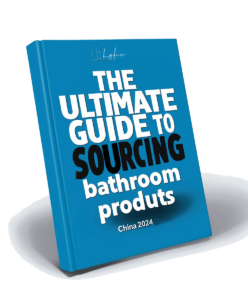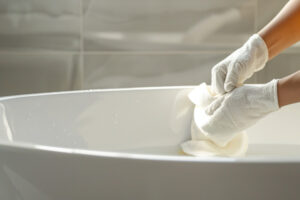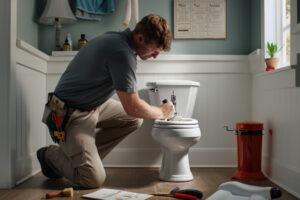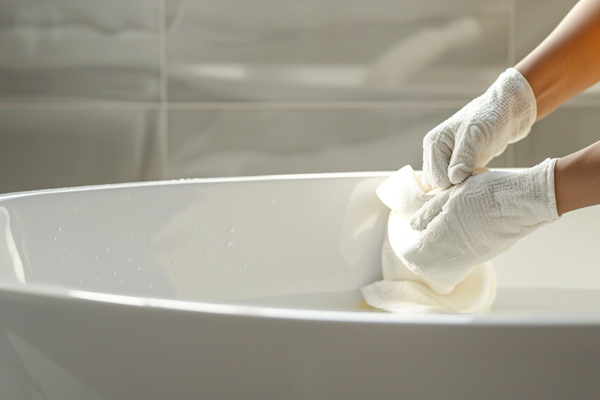
Acrylic showers and tubs scratch easily. Learn how to clean them safely and properly.
Use non-abrasive products1 and soft tools to clean acrylic showers and bathtubs without causing damage.
Cleaning wrong will ruin the shine. Let me show you how to avoid costly mistakes.
What Is the Best Way to Clean an Acrylic Shower or Tub?
Acrylic is strong but scratches easily. Harsh cleaners can destroy its shine fast.
Use mild soap2, water, and a soft cloth to clean acrylic surfaces without damage.
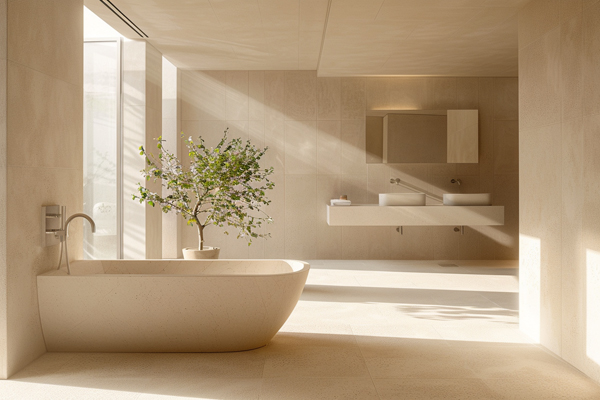
Step-by-Step Cleaning Method
| Step | Product | Tool | Action |
|---|---|---|---|
| 1 | Warm water | Soft cloth | Rinse the surface |
| 2 | Dish soap | Non-abrasive sponge | Clean with circular motion |
| 3 | Water | Showerhead | Rinse away all residues |
| 4 | Dry towel | Microfiber | Dry thoroughly to prevent spots |
I always use this method because it's simple and gentle. Just rinse, soap, rinse again, and dry. It works every time and keeps my acrylic tub smooth and shiny. I never skip drying. Water spots can dull the surface even if you cleaned well.
Which Cleaning Products Are Safe for Acrylic Surfaces?
Using the wrong product will damage acrylic. Some chemicals react and leave white patches or cause discoloration.
Use mild soap, white vinegar, or acrylic-safe cleaners only.
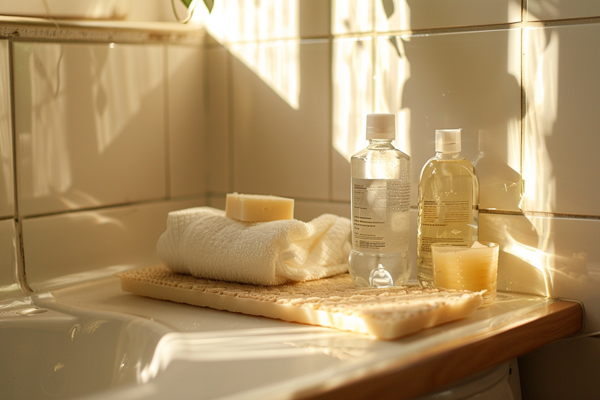
Safe and Unsafe Cleaning Products
| Product Type | Safe | Unsafe |
|---|---|---|
| Mild dish soap | ✅ | |
| White vinegar | ✅ | |
| Bleach | ❌ | |
| Ammonia-based products | ❌ | |
| Baking soda (light use) | ✅ | |
| Abrasive powders | ❌ |
I used a bathroom spray once that wasn't labeled for acrylic—it left the finish dull and cloudy. Now I read labels and test a small corner first. It's safer and smarter.
How Often Should You Clean Your Acrylic Shower or Bathtub?
Waiting too long leads to buildup and stains. Acrylic2 can trap grime fast.
Clean once a week and deep clean monthly to keep the surface fresh.
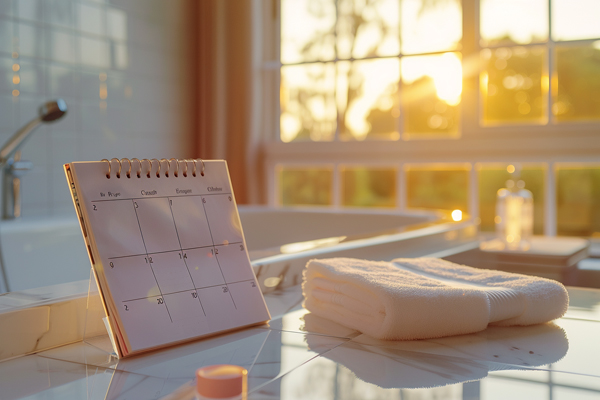
Cleaning Frequency Guide
| Cleaning Type | Frequency | Reason |
|---|---|---|
| Light cleaning | Weekly | Prevent soap scum and mildew |
| Deep cleaning | Monthly | Remove buildup and hidden grime |
| Wipe down | After use | Reduce moisture and prevent spots |
I clean mine every Sunday. It's part of my weekend routine. A quick 10-minute wipe keeps things clean and smooth. Once a month, I take more time to deep clean every corner. That way, no surprises.
Can Vinegar and Baking Soda Be Used on Acrylic Tubs?
Natural cleaners are popular, but not all are acrylic-safe without care.
Vinegar and baking soda are safe when used gently and rinsed completely.3
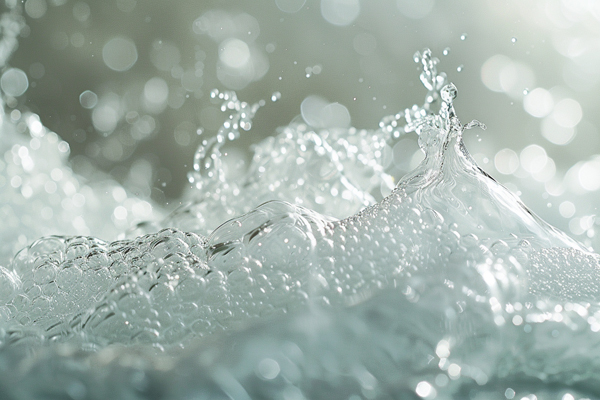
How to Use Vinegar and Baking Soda Safely
| Ingredient | Use Method | Rinse Needed |
|---|---|---|
| Baking soda | Sprinkle lightly on surface | ✅ |
| White vinegar | Spray over baking soda | ✅ |
| Water | Rinse surface after fizzing stops | ✅ |
I mix a little baking soda on the tub, then spray vinegar. It fizzes and lifts dirt. After 10 minutes, I rinse it off with warm water. It’s safe—but don’t scrub hard or leave it too long.
How Do You Remove Tough Stains from an Acrylic Tub or Shower?
Some stains won’t budge with soap. You need targeted but safe methods.
Use hydrogen peroxide paste4 or natural solutions for stubborn stains.
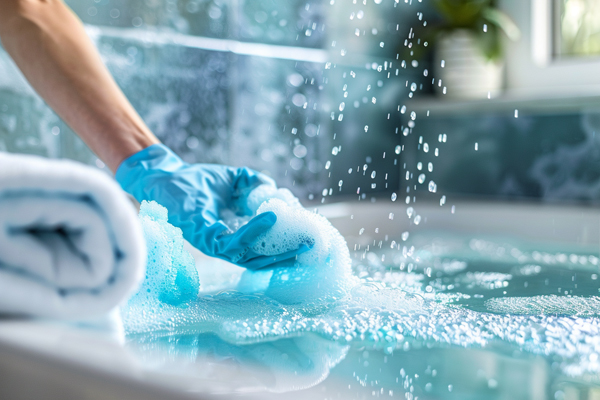
Types of Stains and How to Treat Them
| Stain Type | Solution Suggestion | Tool |
|---|---|---|
| Soap scum | Vinegar and soft sponge | Sponge |
| Hard water marks | Lemon juice | Microfiber |
| Hair dye stains | Hydrogen peroxide paste | Soft cloth |
| Mold/mildew | Vinegar + baking soda mixture | Soft brush |
One time, a dark shampoo stain stayed after regular cleaning. I applied a hydrogen peroxide paste and left it for 15 minutes. It lifted the color without damage. Never use bleach—acrylic doesn’t like it.
What Tools Should You Use to Clean Acrylic Without Scratching It?
Even the right cleaner can cause harm if the tool is too rough.
Always use soft tools like microfiber cloths or soft sponges.
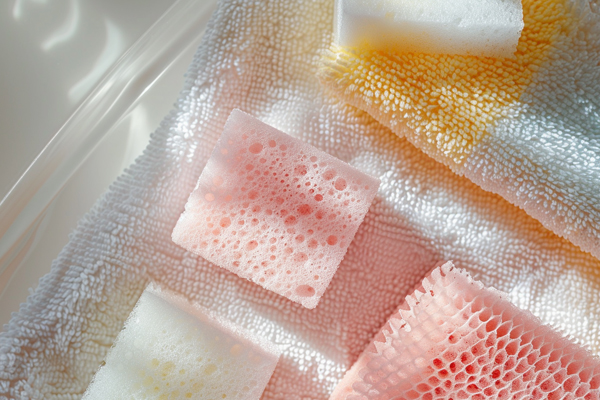
Tool Safety Table
| Tool | Safe | Unsafe |
|---|---|---|
| Microfiber cloth | ✅ | |
| Soft sponge | ✅ | |
| Magic eraser (gentle)5 | ⚠️ | |
| Steel wool | ❌ | |
| Abrasive brush | ❌ |
If a tool feels rough in your hand, it’s too rough for your tub. That’s my rule. I keep an extra pack of microfiber cloths under the sink. They work on everything without risk.
How Can You Prevent Mold and Mildew in an Acrylic Shower?
Mold loves moisture. If you don’t dry it, it will grow—especially in corners.
Keep it dry, air it out, and clean regularly to stop mold.
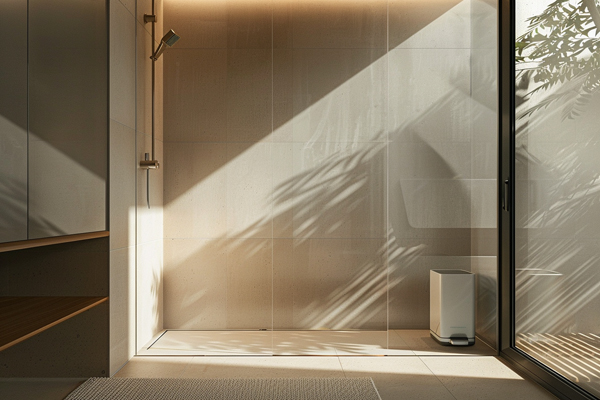
Mold Prevention Checklist
- Open windows or use exhaust fans after showering
- Wipe down walls with a towel or squeegee
- Spray vinegar once a week as a natural disinfectant6
- Keep bathroom door open after use
- Use a dehumidifier if your home stays damp
Since I started drying the shower after use, mold hasn’t come back. A 30-second wipe saves hours of scrubbing later.
Is It Safe to Use Magic Erasers or Abrasive Pads on Acrylic?
They seem soft, but they are mildly abrasive and can dull the surface.
Use Magic Erasers only for small spots with very light pressure.
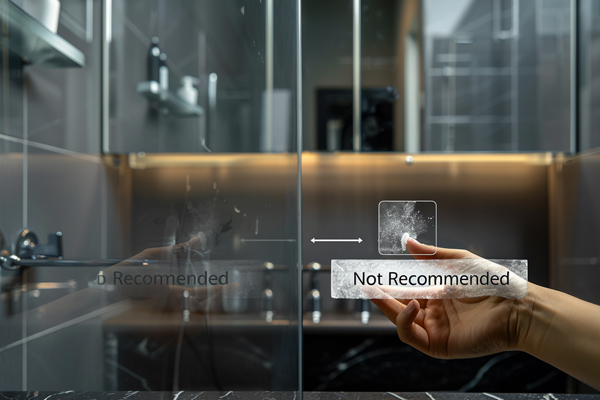
Safe Use of Magic Erasers7
| Surface Area | Use or Avoid | Notes |
|---|---|---|
| Small stains | Use lightly | Apply gentle pressure only |
| Entire wall | Avoid | Risk of dulling large areas |
| Corners | Use | Good for grime with care |
I used one to clean around the drain. It worked, but I rubbed too hard in one spot. That area now looks slightly dull. I learned to go slower and lighter.
Why Does My Acrylic Bathtub Look Cloudy After Cleaning?
Cloudiness usually means leftover residue or fine scratches.
Soap scum, minerals, or rough tools can make acrylic look cloudy.8
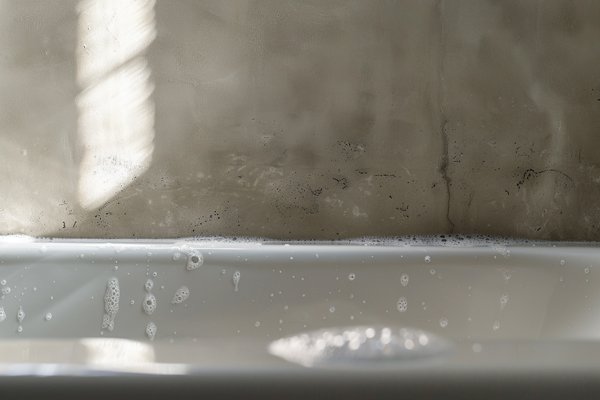
Reasons for Cloudiness
| Cause | Fix |
|---|---|
| Soap residue | Rinse better, use less soap |
| Hard water minerals | Use vinegar rinse regularly |
| Micro scratches | Avoid rough sponges or abrasive pads |
I had this issue after using a multipurpose scrubber. I thought it was safe, but it left haze behind. Since then, I switched to a gentler sponge and rinse more thoroughly.
How Do You Deep Clean an Acrylic Bathtub Step-by-Step?
Deep cleaning is needed monthly to keep everything spotless and safe.
Use soaking, scrubbing, and drying methods for a full reset.
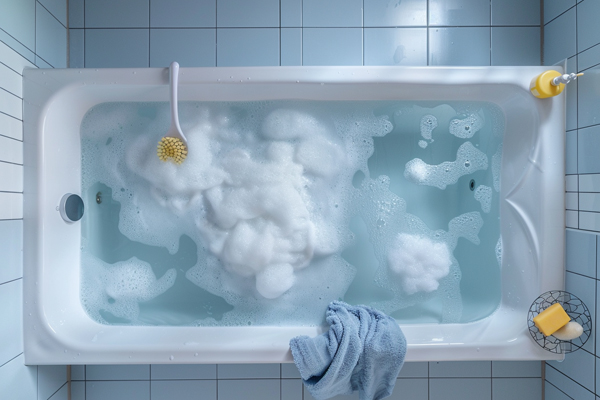
Full Cleaning Routine Table
| Step | Action | Product | Tool |
|---|---|---|---|
| 1 | Rinse tub with warm water | Water | Showerhead |
| 2 | Apply baking soda across surface | Baking soda | Soft sponge |
| 3 | Spray vinegar over baking soda | White vinegar | Spray bottle |
| 4 | Let sit for 10 minutes | — | — |
| 5 | Scrub gently | — | Soft sponge |
| 6 | Rinse completely | Water | Showerhead |
| 7 | Dry with soft cloth | — | Microfiber towel |
I do this every first weekend of the month. The fizz from baking soda9 and vinegar loosens up hidden dirt. I rinse it all off, dry it fully, and enjoy the shine like it’s brand new.
Conclusion
To clean acrylic safely, use soft tools and safe cleaners weekly, rinse well, avoid abrasives, and deep clean monthly to prevent buildup.
-
Discover effective non-abrasive cleaning products that will help maintain the shine of your acrylic showers without causing damage. ↩
-
Explore this link to discover effective cleaning products specifically designed for Acrylic surfaces, ensuring longevity and shine. ↩ ↩
-
Discover expert insights on using vinegar and baking soda safely for cleaning acrylic tubs without damage. ↩
-
Explore how hydrogen peroxide paste can effectively tackle tough stains without damaging surfaces. ↩
-
Find out if Magic erasers are truly safe for various surfaces and how to use them effectively without damage. ↩
-
Discover effective natural disinfectants that can help you combat mold and keep your bathroom fresh and clean. ↩
-
Explore this link to understand the safety and effectiveness of Magic Erasers on acrylic, ensuring you protect your surfaces while cleaning. ↩
-
Understanding the causes of cloudiness can help you choose the right cleaning methods and products for your acrylic bathtub. ↩
-
Explore how baking soda can enhance your cleaning routine and tackle tough stains effectively. ↩


